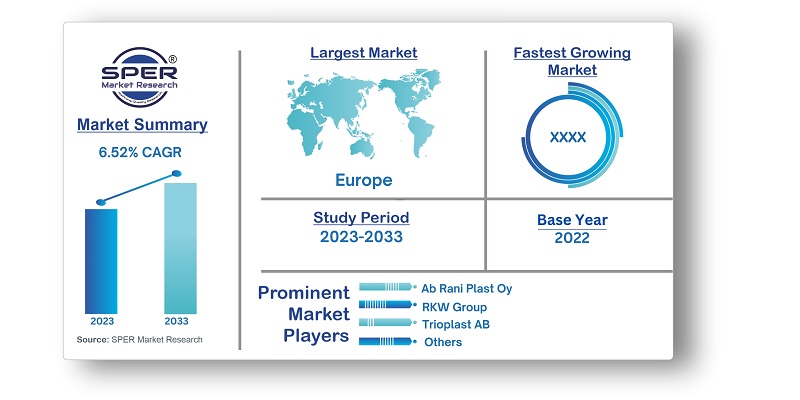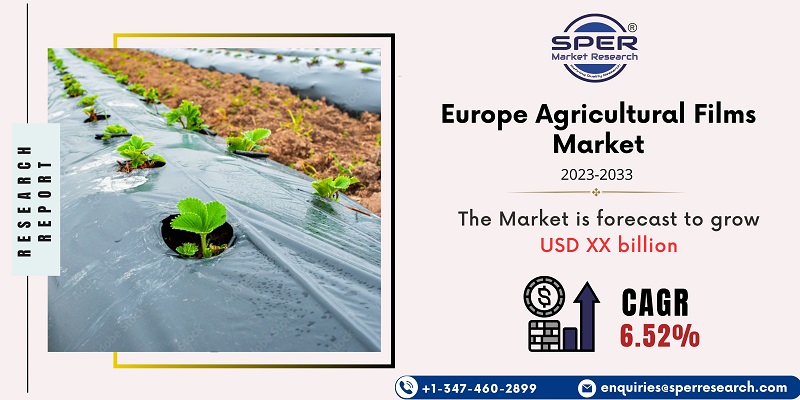
Europe Agricultural Films Market Growth, Size, Trends, Revenue, Share, Scope and Future Outlook
Europe Agricultural Films Market Size- By Type, By Application- Regional Outlook, Competitive Strategies and Segment Forecast to 2033
| Published: Nov-2023 | Report ID: AGRI2353 | Pages: 1 - 152 | Formats*: |
| Category : Agriculture | |||
- BASF SE announced the purchase of Solvay's polyamide division. BASF gained the potential to develop its business by operating eight production locations in various nations throughout the world, including India, South Korea, China, North America, Europe, Mexico, and Brazil, as a result of this transaction. Lucro Plastecycle, an Indian recycling company, and Dow Inc. have signed an agreement of cooperation.


| Report Metric | Details |
| Market size available for years | 2019-2033 |
| Base year considered | 2022 |
| Forecast period | 2023-2033 |
| Segments covered | By Type, By Application |
| Regions covered | Netherlands, France, United Kingdom, Italy, Germany, Spain, Portugal, Poland |
| Companies Covered | Ab Rani Plast Oy, Berry Global, RKW Group, Trioplast AB, Polifilm GmbH, BASF, Duo Plast AG, Barbier Group, Luigi Bandera SpA, Others |
- Farmers and Agricultural Producers
- Agricultural Product Manufacturers
- Distributors and Retailers
- Agricultural Associations and Organizations
- Government Agencies
- Investors and Financial Institutions
- Research and Development Professionals
- Environmental and Sustainability Groups
- Academic Institutions
- Consultants and Advisors
- Media and Publications
- Suppliers of Agricultural Equipment
| By Type: |
|
| By Application: |
|
- Europe Agricultural Films Market Size (FY’2023-FY’2033)
- Overview of Europe Agricultural Films Market
- Segmentation of Europe Agricultural Films Market By Type (Low Density Polyethylene, Linear Low-Density Polyethylene, Others)
- Segmentation of Europe Agricultural Films Market By Application (Greenhouse, Silage, Mulching, Others)
- Statistical Snap of Europe Agricultural Films Market
- Expansion Analysis of Europe Agricultural Films Market
- Problems and Obstacles in Europe Agricultural Films Market
- Competitive Landscape in the Europe Agricultural Films Market
- Impact of COVID-19 and Demonetization on Europe Agricultural Films Market
- Details on Current Investment in Europe Agricultural Films Market
- Competitive Analysis of Europe Agricultural Films Market
- Prominent Players in the Europe Agricultural Films Market
- SWOT Analysis of Europe Agricultural Films Market
- Europe Agricultural Films Market Future Outlook and Projections (FY’2023-FY’2033)
- Recommendations from Analyst
1.1. Scope of the report1.2. Market segment analysis
2.1. Research data source2.1.1. Secondary Data2.1.2. Primary Data2.1.3. SPER’s internal database2.1.4. Premium insight from KOL’s2.2. Market size estimation2.2.1. Top-down and Bottom-up approach2.3. Data triangulation
4.1. Driver, Restraint, Opportunity and Challenges analysis4.1.1. Drivers4.1.2. Restraints4.1.3. Opportunities4.1.4. Challenges4.2. COVID-19 Impacts of the Europe Agricultural Films Market
5.1. SWOT Analysis5.1.1. Strengths5.1.2. Weaknesses5.1.3. Opportunities5.1.4. Threats5.2. PESTEL Analysis5.2.1. Political Landscape5.2.2. Economic Landscape5.2.3. Social Landscape5.2.4. Technological Landscape5.2.5. Environmental Landscape5.2.6. Legal Landscape5.3. PORTER’s Five Forces5.3.1. Bargaining power of suppliers5.3.2. Bargaining power of buyers5.3.3. Threat of Substitute5.3.4. Threat of new entrant5.3.5. Competitive rivalry5.4. Heat Map Analysis
6.1. Europe Agricultural Films Market Manufacturing Base Distribution, Sales Area, Product Type6.2. Mergers & Acquisitions, Partnerships, Product Launch, and Collaboration in Europe Agricultural Films Market
7.1. Europe Agricultural Films Market Value Share and Forecast, By Type, 2023-20337.2. Low Density Polyethylene7.3. Linear Low-Density Polyethylene7.4. Others
8.1. Europe Agricultural Films Market Value Share and Forecast, By Application , 2023-20338.2. Greenhouse8.3. Silage8.4. Mulching8.5. Others
9.1. Europe Agricultural Films Market Size and Market Share
10.1. Europe Agricultural Films Market Size and Market Share By Type (2019-2026)10.2. Europe Agricultural Films Market Size and Market Share By Type (2027-2033)
11.1. Europe Agricultural Films Market Size and Market Share By Application (2019-2026)11.2. Europe Agricultural Films Market Size and Market Share By Application (2027-2033)
12.1. Europe Agricultural Films Market Size and Market Share By Region (2019-2026)12.2. Europe Agricultural Films Market Size and Market Share By Region (2027-2033)12.3. Netherlands12.4. France12.5. United Kingdom12.6. Italy12.7. Germany12.8. Spain12.9. Portugal12.10. Poland
13.1. Ab Rani Plast Oy13.1.1. Company details13.1.2. Financial outlook13.1.3. Product summary13.2. Berry Global13.1.4. Recent developments13.2.1. Company details13.2.2. Financial outlook13.2.3. Product summary13.2.4. Recent developments13.3. RKW Group13.3.1. Company details13.3.2. Financial outlook13.3.3. Product summary13.3.4. Recent developments13.4. Trioplast AB13.4.1. Company details13.4.2. Financial outlook13.4.3. Product summary13.4.4. Recent developments13.5. Polifilm GmbH13.5.1. Company details13.5.2. Financial outlook13.5.3. Product summary13.5.4. Recent developments13.6. BASF13.6.1. Company details13.6.2. Financial outlook13.6.3. Product summary13.6.4. Recent developments13.7. Duo Plast AG13.7.1. Company details13.7.2. Financial outlook13.7.3. Product summary13.7.4. Recent developments13.8. Barbier Group13.8.1. Company details13.8.2. Financial outlook13.8.3. Product summary13.8.4. Recent developments13.9. Luigi Bandera SpA13.9.1. Company details13.9.2. Financial outlook13.9.3. Product summary13.9.4. Recent developments13.10. Others
SPER Market Research’s methodology uses great emphasis on primary research to ensure that the market intelligence insights are up to date, reliable and accurate. Primary interviews are done with players involved in each phase of a supply chain to analyze the market forecasting. The secondary research method is used to help you fully understand how the future markets and the spending patterns look likes.
The report is based on in-depth qualitative and quantitative analysis of the Product Market. The quantitative analysis involves the application of various projection and sampling techniques. The qualitative analysis involves primary interviews, surveys, and vendor briefings. The data gathered as a result of these processes are validated through experts opinion. Our research methodology entails an ideal mixture of primary and secondary initiatives.



Frequently Asked Questions About This Report
PLACE AN ORDER
Year End Discount
Sample Report
Pre-Purchase Inquiry
NEED CUSTOMIZATION?
Request CustomizationCALL OR EMAIL US
100% Secure Payment






Related Reports
Our Global Clients
Our data-driven insights have influenced the strategy of 200+ reputed companies across the globe.




















